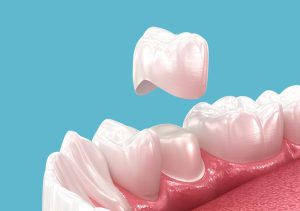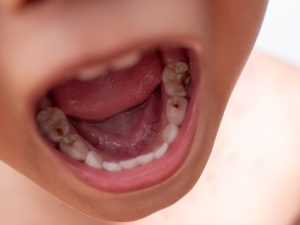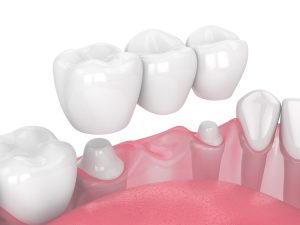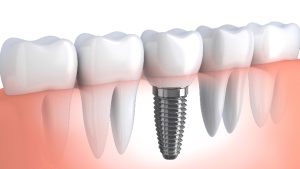Know When to Visit the Dentist for a Dental Crown
 Dental crowns play a vital role in restoring damaged teeth, improving aesthetics, and maintaining long-term dental health. If you’re experiencing dental issues or have concerns about the condition of your teeth, it’s important to recognize the signs that indicate a dental crown may be necessary.
Dental crowns play a vital role in restoring damaged teeth, improving aesthetics, and maintaining long-term dental health. If you’re experiencing dental issues or have concerns about the condition of your teeth, it’s important to recognize the signs that indicate a dental crown may be necessary.
Dr. Edward Ambis, a trusted dentist in Ithaca, NY, is here to guide you through this informative journey. Our practice welcomes patients from Lansing, Dryden, and Trumansburg who need comprehensive dental care. Call 607-272-1874 to learn more about your dental crown options.
Dr. Ambis’s Four-Decade Crown Experience
At the Edward J. Ambis Center for Dental Medicine, patients benefit from over 40 years of restorative dentistry experience. Dr. Ambis combines his extensive background with advanced training from the Resnik Implant Institute to deliver superior crown treatments. His additional master’s degree in Speech Pathology and Audiology allows him to consider how crown placement affects speech patterns and oral function.
Our Ithaca dental practice utilizes the highest grade porcelain materials to create crowns that look and feel like natural teeth. Each restoration is custom-designed to match your existing teeth perfectly while providing optimal function. Dr. Ambis’s comprehensive approach addresses not just the immediate problem but also considers long-term oral health implications.
The residential setting of our dental office provides a comfortable, relaxing environment that differs from typical clinical settings. This atmosphere, combined with our sedation dentistry options, helps anxious patients receive the care they need in complete comfort.
Do You Need a Dental Crown?
Severe Tooth Decay or Cavities
When tooth decay or cavities progress to an advanced stage, a dental crown may be necessary to restore the tooth’s structure and prevent further damage.
 Pain or Tooth Sensitivity: If you experience persistent toothaches or sensitivity to hot or cold substances, it could indicate that the decay or cavity has reached the nerve of the tooth. In such cases, a dental crown may be necessary to protect the tooth and alleviate discomfort.
Pain or Tooth Sensitivity: If you experience persistent toothaches or sensitivity to hot or cold substances, it could indicate that the decay or cavity has reached the nerve of the tooth. In such cases, a dental crown may be necessary to protect the tooth and alleviate discomfort.- Visible Signs of Decay: If you can see visible signs of decay, such as dark spots, holes, or pits on the surface of your tooth, it’s a clear indication that the decay has progressed significantly. A dental crown can help restore the tooth’s structure and prevent further damage.
- Large Cavity Formation: When cavities become too large for traditional fillings to adequately restore the tooth, crowns provide the comprehensive coverage needed. The remaining healthy tooth structure requires protection from further bacterial invasion.
Cracked or Fractured Teeth
Accidents or trauma can lead to cracked or fractured teeth, compromising their strength and function.
- Pain When Chewing: If you experience pain or discomfort when biting or chewing, it could be a sign of a cracked or fractured tooth. The pressure applied during chewing can cause the crack to widen, resulting in pain. A dental crown can help stabilize the tooth and distribute the biting forces more evenly.
- Sensitivity to Temperature: Cracked teeth can be sensitive to hot or cold temperatures. If you feel a sharp, fleeting pain when consuming hot or cold substances, it may be a sign of a cracked tooth. A dental crown can provide protection and insulation, reducing sensitivity.
- Visible Cracks or Fractures: In some cases, you may be able to see visible cracks or fractures on the tooth. These cracks can vary in size and location, ranging from small surface cracks to more extensive fractures. A dental crown can cover and support the damaged tooth structure.
- Tongue or Cheek Irritation: If a cracked tooth has rough or jagged edges, it can irritate the tongue or inner cheek. You may experience discomfort or notice small cuts or sores in these areas. A dental crown can smooth out the surface of the tooth, eliminating irritation.
Large Fillings That Need Replacement
If you have a tooth with a large dental filling, it may become weak over time and require crown protection.
 Failing or Deteriorating Filling: Over time, large fillings can weaken or deteriorate due to factors such as wear, recurrent decay, or fracture. If you notice that your filling is dislodged, cracked, or no longer providing proper coverage, a dental crown may be necessary to restore the tooth’s strength and function.
Failing or Deteriorating Filling: Over time, large fillings can weaken or deteriorate due to factors such as wear, recurrent decay, or fracture. If you notice that your filling is dislodged, cracked, or no longer providing proper coverage, a dental crown may be necessary to restore the tooth’s strength and function.- Tooth Sensitivity Around Fillings: Large fillings can make the tooth more sensitive to hot or cold temperatures. If you experience increased sensitivity or discomfort when consuming hot or cold substances, it could be a sign that the filling is no longer adequately protecting the tooth.
- Recurring Decay Around Fillings: When decay develops around the edges of large fillings, it indicates that the seal between the filling and tooth has been compromised. Crowns provide better coverage and sealing properties than traditional fillings.
Root Canal Treatment Recovery
After undergoing a root canal treatment, the affected tooth may require a dental crown to protect and strengthen it.
- Weakened Tooth Structure: Root canal procedures require removing infected tissue and significant tooth structure. This leaves the tooth hollow and more susceptible to fracture under normal chewing forces.
- Back Tooth Protection: Molars and premolars that have received root canal treatment, especially, need crown protection. These teeth endure substantial biting forces that can easily cause fractures in weakened tooth structure.
- Long-term Preservation: A crown adds an extra layer of protection, helping to preserve the tooth for many years after root canal treatment. Without proper protection, root canal-treated teeth often require extraction.
Ready to restore your damaged tooth? Contact Dr. Ambis at 607-272-1874 to schedule your consultation at our Ithaca dental practice. We provide comprehensive crown services for patients throughout the greater Ithaca area.
Misshapen or Discolored Teeth
Do you have misshapen or severely discolored teeth that affect your smile? Dental crowns can be an effective cosmetic solution to enhance the appearance of your teeth.
- Severe Discoloration: Teeth that have become severely stained or discolored due to medications, trauma, or other factors may not respond to traditional teeth whitening treatments. Crowns can provide a bright, natural-looking color that matches your other teeth.
- Irregular Tooth Shape: Some people are born with teeth that are unusually shaped, too small, or have irregular contours. Dental crowns can reshape these teeth to create a more uniform and attractive smile.
- Worn-Down Teeth: Teeth that have been worn down due to grinding, acid erosion, or age can be restored to their proper size and shape with dental crowns.
Dental Bridge Support
When replacing a missing tooth with a dental bridge, the adjacent teeth that support the bridge may need dental crowns.
 Anchor Tooth Preparation: The teeth on either side of a missing tooth gap must be crowned to serve as anchors for the bridge. This provides a stable foundation for the replacement tooth.
Anchor Tooth Preparation: The teeth on either side of a missing tooth gap must be crowned to serve as anchors for the bridge. This provides a stable foundation for the replacement tooth.- Structural Support: Crowning the anchor teeth distributes the chewing forces across multiple teeth rather than concentrating stress on the natural tooth structure. This approach helps prevent damage to the supporting teeth.
- Aesthetic Continuity: Crown placement on bridge anchor teeth allows the entire restoration to blend seamlessly with your natural smile.
Cracked Enamel Protection
The outer layer of your teeth, known as enamel, is essential for protecting the inner structures. If your enamel is cracked or significantly worn down, a dental crown can shield the affected tooth from further damage.
- Visible Cracks or Lines: If you notice visible cracks or lines on the surface of your tooth enamel, it could be a sign of enamel damage. These cracks may be hairline or more significant, depending on the severity of the condition. A dental crown can help protect the cracked enamel.
- Rough or Jagged Edges: Cracks in the enamel can create rough or jagged edges on the tooth surface. These rough edges can irritate the tongue, cheeks, or gums, leading to discomfort or soreness. A dental crown can smooth out the surface, improving comfort.
- Discoloration or Stains: Cracked enamel can sometimes result in discoloration or staining of the affected tooth. This occurs when food particles or pigments enter the cracks and become trapped. A dental crown can restore the tooth’s natural appearance.
Tooth Grinding (Bruxism) Damage
Persistent tooth grinding, also known as bruxism, can lead to excessive wear and tear on your teeth. Dental crowns can help restore the shape and structure of your teeth.
- Worn or Flattened Tooth Surfaces: Bruxism can cause excessive wear on the tooth surfaces over time. If you notice that your teeth appear flat or have developed uneven wear patterns, it may indicate tooth grinding. A dental crown can restore the natural shape and structure of the teeth.
- Jaw Pain or Headaches: Bruxism can contribute to jaw pain, temporomandibular joint (TMJ) disorders, and headaches. If you frequently wake up with a sore jaw or experience recurring headaches, it may be due to excessive grinding of your teeth.
- Tooth Mobility: Prolonged bruxism can lead to the loosening of teeth. If you notice that one or more teeth have become slightly mobile or feel loose, it could be a result of the excessive forces applied during grinding.
Dental Implant Restoration
When replacing a missing tooth with a dental implant, a dental crown is typically used to cover the implant post.
 Natural Tooth Replacement: The crown acts as a natural-looking replacement tooth that blends seamlessly with your smile. It provides the visible portion of the implant restoration.
Natural Tooth Replacement: The crown acts as a natural-looking replacement tooth that blends seamlessly with your smile. It provides the visible portion of the implant restoration.- Functional Restoration: Implant crowns restore full chewing function, allowing you to eat all your favorite foods without restriction.
- Bone Preservation: Implant crowns help maintain jawbone density by providing the stimulation that natural tooth roots once provided.
Aesthetic Enhancement Needs
If you are unhappy with the appearance of your teeth due to gaps, misalignment, or other cosmetic issues, dental crowns can help you achieve the smile you desire.
- Gap Closure: Crowns can be shaped to close small gaps between teeth, creating a more uniform smile line.
- Minor Alignment Correction: Slight tooth misalignment can sometimes be corrected with crown placement, avoiding the need for orthodontic treatment.
- Size and Proportion Issues: Teeth that are too small or disproportionate to the rest of your smile can be enlarged and reshaped with crowns.
Choosing the Right Dental Crown
When considering a permanent crown, it’s important to understand the different types available. Your dentist will recommend the most suitable option based on your specific needs. Let’s explore some common types of dental crowns:
- Porcelain Crowns: These crowns are known for their natural appearance and are excellent for restoring front teeth. They can be color-matched to blend seamlessly with the surrounding teeth.
- Zirconia Crowns: Made from a durable and biocompatible material called zirconium dioxide, these crowns offer exceptional durability and resistance to chipping or cracking. Zirconia crowns are known for their translucent appearance.
- Metal Crowns: Made from metals like gold or silver alloy, metal crowns are durable and resistant to wear. Metal crowns rarely chip, but their metallic appearance makes them more suitable for molars or teeth that are less visible when you smile.
- Porcelain-fused-to-metal (PFM) Crowns: These crowns combine the strength of metal with the aesthetic appeal of porcelain. They’re a popular choice for both front and back teeth.
Factors to Consider
When considering a dental crown, there are several important factors to keep in mind:
- Longevity: Dental crowns are built to be long-lasting, but the actual lifespan can vary depending on factors like oral hygiene, habits, and the material used. Discuss the expected longevity of different crown options with your dentist.
- Appearance: If you have cosmetic concerns, such as front teeth that are visible when you smile, consider the aesthetic aspect of the crown. Porcelain or all-ceramic crowns are excellent options for a natural and pleasing appearance.
- Tooth Preparation: The extent of tooth preparation required for a dental crown can vary. In some cases, minimal preparation is sufficient, while in others, more significant reshaping may be necessary.
Ready to explore your crown options? Call our Ithaca dental practice at 607-272-1874 to discuss your specific needs with Dr. Ambis. We proudly welcome patients from Trumansburg, Lansing, and Dryden for comprehensive dental crown services.
